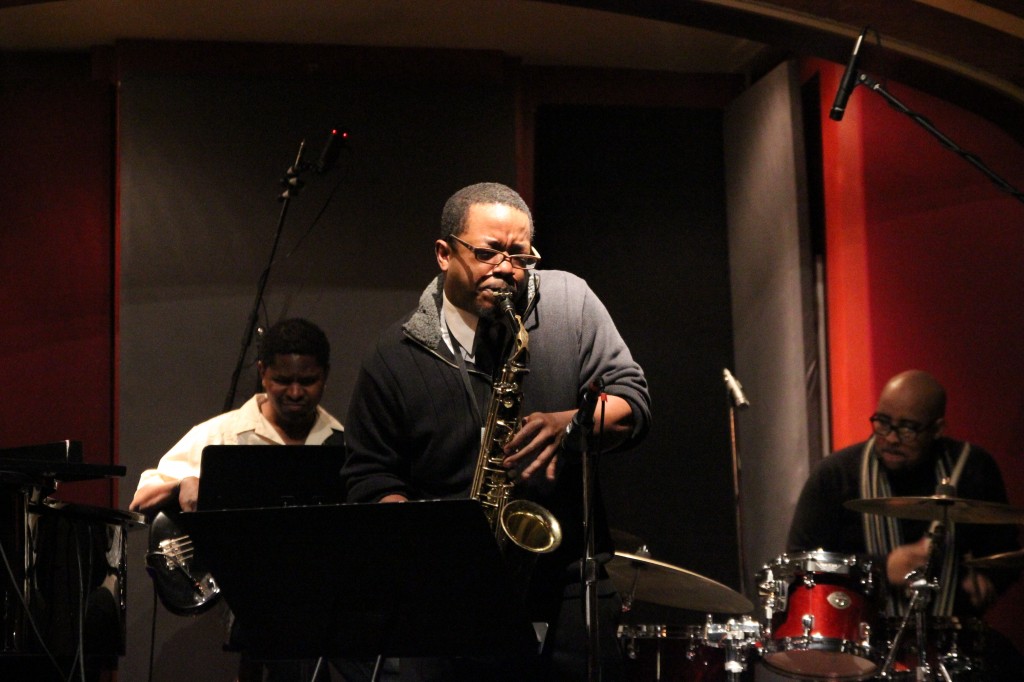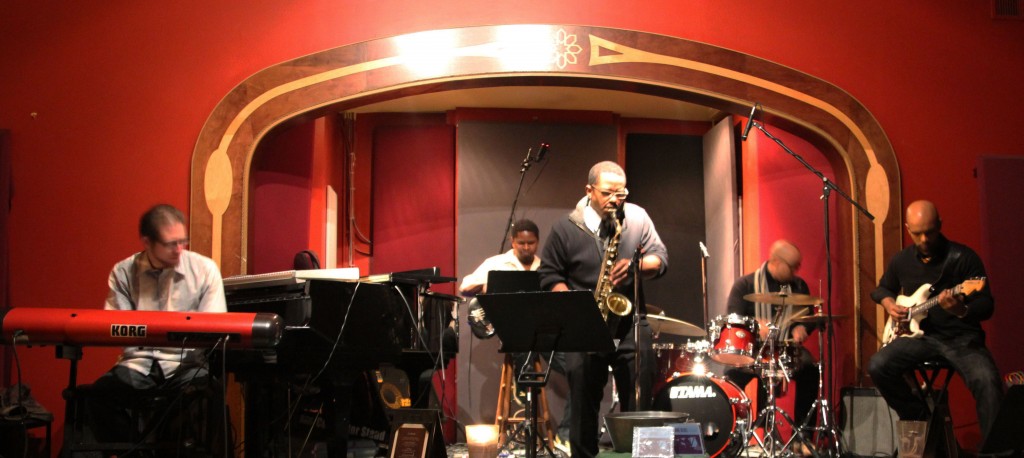by Rebecca Grace

Atlanta transplant Darryl Reeves is a musician, composer, teacher and saxophone player extraordinaire. Reeves wooed the crowd last Friday night at the respected jazz club, Churchill Grounds, with a group of amazing musicians: Nick Rosen on keyboards, Rod Harris, Jr. on guitar, Kenton Bostick on drums (Henry Conerway, III was a stand-in for the first set, Friday night), and Khari Simmons on bass. One wonders, how did these guys get so good? Were they born with it? Did they just work hard? Perhaps, like Reeves, the answer is both.
Reeves was born to a musical family in Jackson, Mississippi. His talent was apparent at just six months old, when his parents caught him humming along to the marching band at a football game. As soon as he was allowed, he tried to figure out how to play the piano. Now, it is his secondary instrument. But that’s not all. Reluctantly, he admits that he can actually play just about anything.
“[I’m] not saying I’m a virtuoso, but I can ‘hold a tune’ on the others [brass instruments, woodwinds, drums, and bass guitar]. I don’t always like telling people that because they sometimes assume that I can do much more than I can in reality,” he says.
But the saxophone is his main instrument. His hands, as he plays it, are those of a lover — confident, easy, smooth. It’s clear that he knows what he’s doing.
His older brother was an influence, Reeves tells the crowd from the microphone, in between songs.
“I was twelve years old, sitting in my brother’s room, listening to his jazz music,” he says.
After that introduction, Reeves began to investigate jazz funk, an often-overlooked period in jazz history when musicians began sampling the funk/rock sounds of artists like Jimi Hendrix, James Brown, Parliament Funkadelic and Sly Stone. In the late 1960s and 70s, jazz purists often dismissed jazz funk as being “commercial,” and straying from traditional swing. While he understands their sentiment, Reeves has wholeheartedly embraced jazz funk for its artistry, musicianship and progressiveness.
“When I finally started to investigate the music for myself, I realized how amazing the music was back then. So today, I embrace jazz funk and want to continue to elevate the contributions from those artists,” he said.
In fact, this was the first time that jazz funk has been featured like this at Churchill Grounds. Friday night, Reeves gave a shout-out to those musicians.
“Tonight, I’m paying tribute to all those people in the subgenre of jazz — jazz funk,” he said.

The first song in the set was “After the Gig” from his fourth independent album, “Diary of a Bandstand.” The group also played music by 1970s artists like Herbie Hancock, Starship Orchestra and Bobby Lyle. Reeves handpicked the musicians who played with him that night. He chose well — there were hoots and hollers after every solo.
“The sound is a refreshing, energetic fusion of 70s funk and contemporary smooth jazz that makes you want to simultaneously relax and dance. They have an infectious energy that moves you through their sounds. My husband and I are looking forward to their next performance,” said graduate writing student, Trina R. Love-Abram.
Reeves is the kind of leader everyone wants at the front of the stage. He is calm, unassuming, quietly funny and genuinely in love with his craft. Slowly but surely, the candle-lit, Turkish-styled room at Churchill Grounds filled to capacity, and all eyes were glued to the stage as the group played their hearts out. It’s hard not to love watching people who play so well — and who do it with soul.
“They’re all so intense and have these great facial expressions when they play,” said Anne Demers, a close friend of Reeves and his wife, graduate writing student, Osayi Endolyn. “I love how into it they are.”
With two degrees in music, multiple tours and recordings with notable artists and a senior faculty position at the Art Institute of Atlanta under his belt, Reeves continues to make a meaningful contribution to music. Friday night’s show was a wonderful look at the future of jazz.
Currently, Reeves is hard at work on his next album, a collection of reinterpretations of classic jazz songs from the jazz funk period, along with Reeves’ new original pieces, which is planned for a late summer release.
Until then, what are Reeves’ plans? He says he’ll “keep climbing, keep it fun and keep it funky!”




















